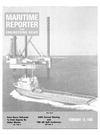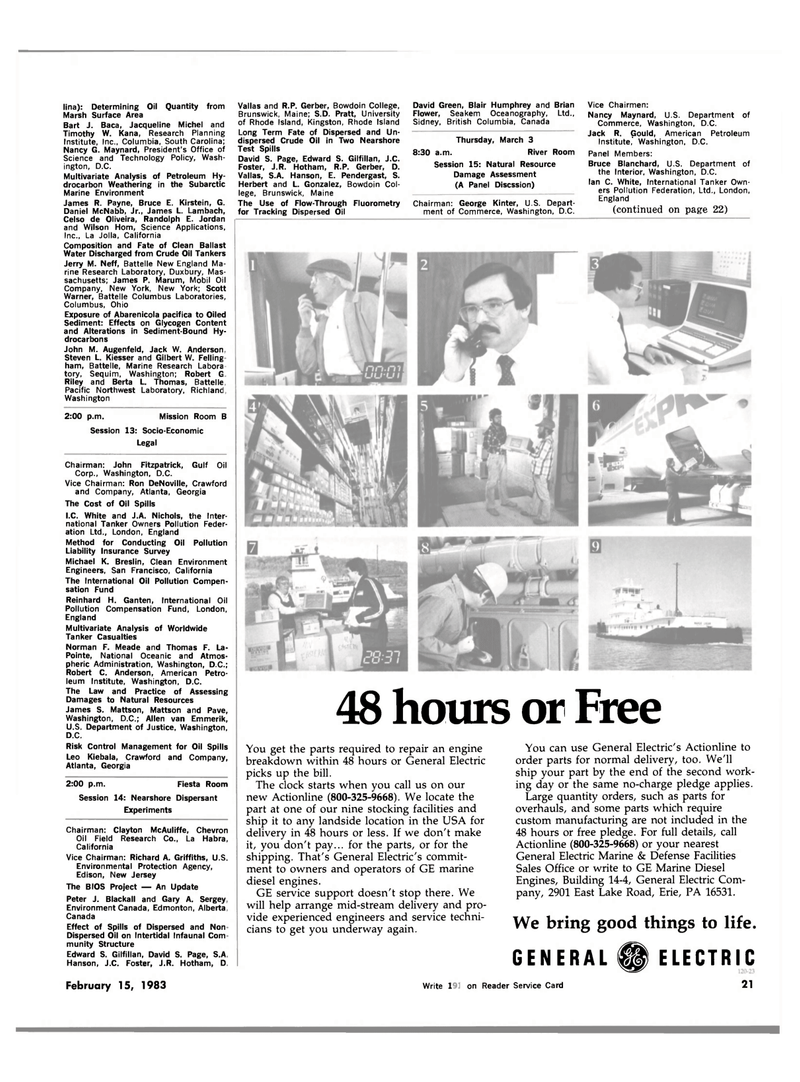
Page 17: of Maritime Reporter Magazine (February 15, 1983)
Read this page in Pdf, Flash or Html5 edition of February 15, 1983 Maritime Reporter Magazine
lina): Determining Oil Quantity from
Marsh Surface Area
Bart J. Baca, Jacqueline Michel and
Timothy W. Kana, Research Planning
Institute, Inc., Columbia, South Carolina;
Nancy G. Maynard, President's Office of
Science and Technology Policy, Wash- ington, D.C.
Multivariate Analysis of Petroleum Hy- drocarbon Weathering in the Subarctic
Marine Environment
James R. Payne, Bruce E. Kirstein, G.
Daniel McNabb, Jr., James L. Lambach,
Celso de Oliveira, Randolph E. Jordan and Wilson Horn, Science Applications,
Inc., La Jolla, California
Composition and Fate of Clean Ballast
Water Discharged from Crude Oil Tankers
Jerry M. Neff, Battelle New England Ma- rine Research Laboratory, Duxbury, Mas- sachusetts; James P. Marum, Mobil Oil
Company, New York, New York; Scott
Warner, Battelle Columbus Laboratories,
Columbus, Ohio
Exposure of Abarenicola pacifica to Oiled
Sediment: Effects on Glycogen Content and Alterations in Sediment-Bound Hy- drocarbons
John M. Augenfeld, Jack W. Anderson,
Steven L. Kiesser and Gilbert W. Felling- ham, Battelle, Marine Research Labora- tory, Sequim, Washington; Robert G.
Riley and Berta L. Thomas, Battelle,
Pacific Northwest Laboratory, Richland,
Washington 2:00 p.m. Mission Room B
Session 13: Socio-Economic
Legal
Chairman: John Fitzpatrick, Gulf Oil
Corp., Washington, D.C.
Vice Chairman: Ron DeNoville, Crawford and Company, Atlanta, Georgia
The Cost of Oil Spills
I.C. White and J.A. Nichols, the Inter- national Tanker Owners Pollution Feder- ation Ltd., London, England
Method for Conducting Oil Pollution
Liability Insurance Survey
Michael K. Breslin, Clean Environment
Engineers, San Francisco, California
The International Oil Pollution Compen- sation Fund
Reinhard H. Ganten, International Oil
Pollution Compensation Fund, London,
England
Multivariate Analysis of Worldwide
Tanker Casualties
Norman F. Meade and Thomas F. La-
Pointe, National Oceanic and Atmos- pheric Administration, Washington, D.C.;
Robert C. Anderson, American Petro- leum Institute, Washington, D.C.
The Law and Practice of Assessing
Damages to Natural Resources
James S. Mattson, Mattson and Pave,
Washington, D.C.; Allen van Emmerik,
U.S. Department of Justice, Washington,
D.C.
Risk Control Management for Oil Spills
Leo Kiebala, Crawford and Company,
Atlanta, Georgia 2:00 p.m. Fiesta Room
Session 14: Nearshore Dispersant
Experiments
Chairman: Clayton McAuliffe, Chevron
Oil Field Research Co., La Habra,
California
Vice Chairman: Richard A. Griffiths, U.S.
Environmental Protection Agency,
Edison, New Jersey
The BIOS Project — An Update
Peter J. Blackall and Gary A. Sergey,
Environment Canada, Edmonton, Alberta,
Canada
Effect of Spills of Dispersed and Non-
Dispersed Oil on Intertidal Infaunal Com- munity Structure
Edward S. Gilfillan, David S. Page, S.A.
Hanson, J.C. Foster, J.R. Hotham, D.
Vallas and R.P. Gerber, Bowdoin College,
Brunswick, Maine; S.D. Pratt, University of Rhode Island, Kingston, Rhode Island
Long Term Fate of Dispersed and Un- dispersed Crude Oil in Two Nearshore
Test Spills
David S. Page, Edward S. Gilfillan, J.C.
Foster, J.R. Hotham, R.P. Gerber, D,
Vallas, S.A. Hanson, E. Pendergast, S.
Herbert and L. Gonzalez, Bowdoin Col- lege, Brunswick, Maine
The Use of Flow-Through Fluorometry for Tracking Dispersed Oil
David Green, Blair Humphrey and Brian
Flower, Seakem Oceanography, Ltd.,
Sidney, British Columbia, Canada
Thursday, March 3 8:30 a.m. River Room
Session 15: Natural Resource
Damage Assessment (A Panel Discssion)
Chairman: George Kinter, U.S. Depart- ment of Commerce, Washington, D.C.
Vice Chairmen:
Nancy Maynard, U.S. Department of
Commerce, Washington, D.C.
Jack R. Gould, American Petroleum
Institute," Washington, D.C.
Panel Members:
Bruce Blanchard, U.S. Department of the Interior, Washington, D.C.
Ian C. White, International Tanker Own- ers Pollution Federation, Ltd., London,
England (continued on page 22) 48 hours or Free
You get the parts required to repair an engine breakdown within 48 hours or General Electric picks up the bill.
The clock starts when you call us on our new Actionline (800-325-9668). We locate the part at one of our nine stocking facilities and ship it to any landside location in the USA for delivery in 48 hours or less. If we don't make it, you don't pay... for the parts, or for the shipping. That's General Electric's commit- ment to owners and operators of GE marine diesel engines.
GE service support doesn't stop there. We will help arrange mid-stream delivery and pro- vide experienced engineers and service techni- cians to get you underway again.
You can use General Electric's Actionline to order parts for normal delivery, too. We'll ship your part by the end of the second work- ing day or the same no-charge pledge applies.
Large quantity orders, such as parts for overhauls, and some parts which require custom manufacturing are not included in the 48 hours or free pledge. For full details, call
Actionline (800-325-9668) or your nearest
General Electric Marine & Defense Facilities
Sales Office or write to GE Marine Diesel
Engines, Building 14-4, General Electric Com- pany, 2901 East Lake Road, Erie, PA 16531.
We bring good things to life.
GENERAL $ ELECTRIC
February 15, 1983 Write 2081 on Reader Service Card 21

 16
16

 18
18
